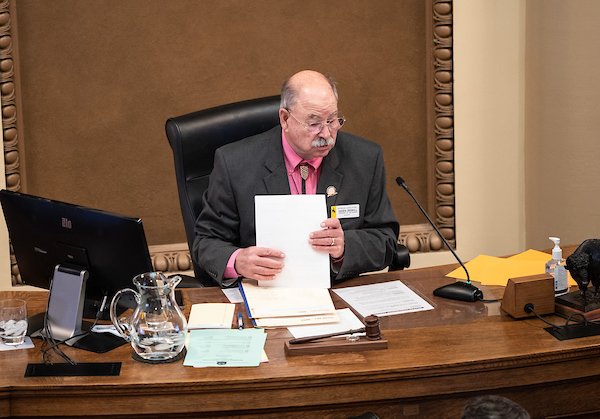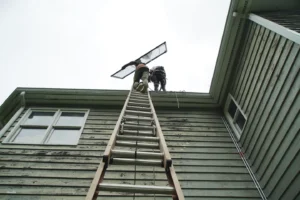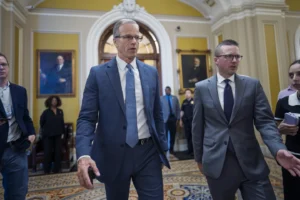Is Wyoming Truly Business Friendly? Task Force to Dig In
New panel will look at reducing regulations for minerals, ag and construction industries
- Published In: Politics
- Last Updated: Apr 10, 2023

Senate President Ogden Driskill (R-Devils Tower) says Wyoming’s regulatory environment is not business friendly and hopes a new task force will improve that. (Photo by Michael Smith)
By CJ Baker
Special to the Wyoming Truth
Wyoming has long prided itself on being business friendly, touting studies that routinely rank the state as one of the best places in the country to do business. But Senate President Odgen Driskill (R-Devils Tower) questions if that’s really the case, noting surrounding states continue to attract more businesses.
“It doesn’t matter if you’re talking north, south, east or west, they’re all doing better than we are,” Driskill said at a March 23 meeting of the Wyoming Legislature’s Management Council, adding, “You might be the best-looking girl at the dance, but if no one’s asking you to dance, there’s a problem.”

He believes the problem is too many regulations and a culture that isn’t business friendly enough; the senate leader said rules at the state and local levels drive up costs and bog down everything from gravel pits to meat packing plants to multi-family homes.
In some industries, “we actually are to the point now where our people would rather deal with the federal government than the State of Wyoming,” Driskill said. “And that tells you something.”
At his urging — and with the support of a couple business advocacy groups — the Management Council created a new Regulatory Reduction Task Force that will examine ways to “reduce the regulatory burden” in Wyoming.
The 11-member panel will meet a few times between now and October before reporting back to the council. Its membership includes six lawmakers, representatives from the Wyoming Department of Environmental Quality, Department of Agriculture and State Fire Marshal’s office, one representative for Wyoming’s cities, town and counties, and four people drawn from the oil and gas, mining, ag and construction industries.
Among those to back the new task force was the Wyoming Business Alliance, whose members range from mom-and-pop enterprises to multinational corporations.
“I will tell you that there is an enormous sense of frustration from the big guys and the little guys as far as operating in Wyoming,” said Cindy DeLancey, the alliance’s president. She attributed that frustration to Wyoming’s uniqueness — where what works in Jackson might not work in Devils Tower — and to complicated sets of rules.
One area of scrutiny will be the state’s use of “primacy,” Driskill said. That’s when Wyoming has assumed the responsibility of administering federal environmental laws, such as those related to groundwater and air quality. In some cases, state regulations go beyond those required by the federal government, and Driskill questions if they’re necessary.
The panel will also examine if streamlining building codes could help ease the state’s housing crisis.
More affordable housing?
Jessie Dafoe of Freedom Path 307 referenced a recent study from the National Association of Home Builders, which asserted roughly 40% of the cost of multifamily housing stems from regulations. Dafoe said her organization has found similar problems in Wyoming, with regulations driving up costs and delaying development. She called it “a critical issue.”
Without adequate housing, “we will continue to hurt for any new business or growing business,” Dafoe said, describing the regulatory review as “a first step of making sure all of the industries in Wyoming thrive.”
House Speaker Rep. Albert Sommers (R-Pinedale) agreed it made sense to look at the regulations, but he said the housing issue requires a more holistic approach.

“It’s also recognizing that there needs to be money in the process to develop affordable housing,” he said. “There’s no other way around it.”
The Legislature put $5 million in the supplemental budget that will be distributed to local governments for “unmet housing needs.” However, Sen. Tara Nethercott (R-Cheyenne) noted lawmakers rejected other proposals — such as a statewide housing trust fund — and that the issue has already been studied.
“We have had these votes in front of us now very directly for two years, and we’ve said ‘No.’ Now we want to spend money of our own to create a task force to do what’s already been done by many communities in this state and the governor,” Nethercott mused.
Still, the senator supported the new panel, as did Rep. Mike Yin (D-Jackson).
“It’s hard for me to believe that Wyoming is overregulated,” Yin said, “but I’m happy to continue covering the topic.”
State vs. local control
Yin, Nethercott and Sommers expressed concern about the task force undermining local control of building codes.
However, if local governments have rules that create paperwork and costs without improving safety, Driskill said they should “knock it off or be prepared for us [lawmakers] to work on it.” He recalled hearing “horror stories” about officials who “basically blackmail” builders into following extra rules.
Jerimiah Rieman, the executive director of the Wyoming County Commissioners Association, said simply having a local government representative on the task force could help solve any problems.
If a concern is raised with a county’s regulations, “often you can go back and start to address that immediately,” Rieman said. “We don’t need to wait for some higher power to tell us what we should or shouldn’t be doing in that space.”
During the Management Council’s discussion, Driskill said he could name “dozens” of examples of overregulation. For instance, he’s heard it can take a fraction of the time and money to open a gravel pit in South Dakota instead of Wyoming. However, he stressed that he doesn’t know what the task force will find when it begins digging in.
“Maybe we find out, yeah, we’re not very onerous on what we do,” he said. “[Or] maybe we do find out that we’re not quite as business friendly as we look like we are.”
The panel isn’t the only entity looking to reduce state regulations. It’s one of the topics being taken up by the joint corporations committee, and Gov. Mark Gordon’s administration is kicking off a multi-year effort to simplify and reduce its rules.
“We all agree that any time we can lessen regulations on our businesses in the state of Wyoming, it’s a good thing,” Sommers said.
The Regulatory Reduction Task Force’s first meeting has yet to be announced.













